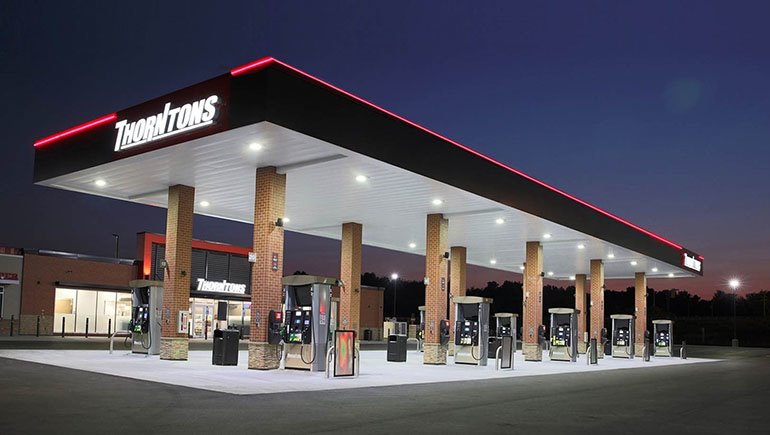
BP has bought out its private equity partner in a chain of US fuel stations, marking a return to the owned-and-operated model for retail sites in the US as energy majors bet on strong growth in electric vehicle charging and convenience stores.
The group will take full control of 208 Thorntons sites, buying out ArcLight Capital Partners’ majority stake, as part of BP’s plans to double earnings from its “convenience and mobility business” to $10bn globally by 2030. Terms of the deal were not disclosed.
“BP aims to increase the number of strategic convenience sites in its global network from around 2,000 today to more than 3,000 by 2030,” the company said. “Convenience retail is evolving amid rising demand from consumers with ever-changing needs.”
The Thorntons sites, which are based across Kentucky, Illinois, Indiana, Ohio, Tennessee and Florida, are primarily in areas served by BP oil refineries including Whiting, Indiana and Toledo, Ohio.
The move back into retail is something of a reversal for the oil industry, which largely sold off or franchised its branded fuel stations in the past decade, as companies poured capital into oil exploration and production while prices rose.
But with BP and rivals such as Shell investing more money in renewable energy and making plans to scale back oil and gas production, retail has re-emerged as one of the pillars of their strategy.
Electric vehicle charging, which is expected to grow rapidly in the coming years, is seen as a good fit with retail given consumers are expected to spend more time at sites than when filling petrol or diesel vehicles.
BP said analysis from Euromonitor suggested the “convenience opportunity” would “nearly double over the next decade in 45 of the leading economies of the world, growing at more than 5 per cent each year”.
In the UK BP has partnered with retailer Marks and Spencer, installing “M&S Simply Food” stores at more than 300 fuel stations. The company estimates that approximately half the stores’ customers visit without buying fuel.
Bernstein Research said this year that the retail side of the energy major’s business was its “most under-appreciated growth driver”.
BP’s earnings were hit hard in 2020 by a 14 per cent drop in fuel sales from its retail network as the pandemic crimped demand. But the company managed to increase the gross margin in its convenience business by 6 per cent.
Growth in emerging markets is also seen as significant. Shell, already the world’s second-largest retailer by number of sites behind 7-Eleven, is expanding its network by more than 20 per cent to 55,000 globally in the next few years. BP aims to increase its number of stations by nearly 50 per cent to 29,000 by 2030.